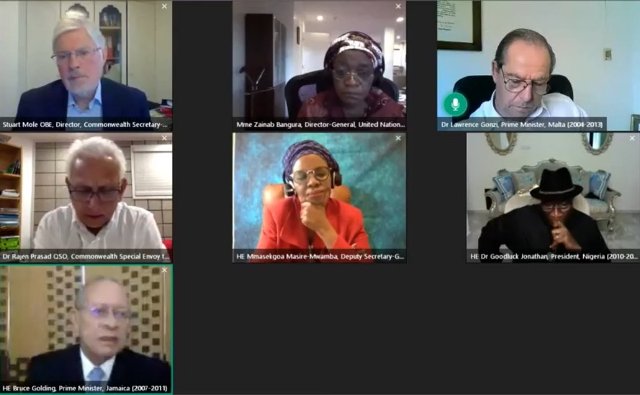 Forum looking at 'Reflecting on the Commonwealth’s Electoral History and Evolution' - [clockwise} Stuart Mole, Zainab Bangura, Lawrence Gonzi, Goodluck Jonathan, Mmasekgoa Masire-Mwamba, Rajen Prasad, Bruce Golding.
Forum looking at 'Reflecting on the Commonwealth’s Electoral History and Evolution' - [clockwise} Stuart Mole, Zainab Bangura, Lawrence Gonzi, Goodluck Jonathan, Mmasekgoa Masire-Mwamba, Rajen Prasad, Bruce Golding.
“You bloody Commonwealth peacemongers. You’re wasting your time and ours.” It was only weeks away from South Africa’s 1994 elections, which were to see the final demise of apartheid and victory for the African National Congress, led by Nelson Mandela. The voice decrying “Commonwealth peacemongers”, supposedly on a mission to nowhere, came from a white, middle-aged male. The object of his scorn were Commonwealth election observers, part of the largest group ever deployed by the organisation.
South Africans, of all communities and colours, supported a negotiated settlement and welcomed international observers, seeing their presence as reassuring and largely impartial. The eyes of the world were upon a national vote which, despite its imperfections, was widely accepted as an authentic expression of the popular will and the beginnings of a post-apartheid future.
Three years before, with Mandela finally released from prison, opposition parties unbanned and the first tentative steps towards multi-party negotiations, President F.W. de Klerk was far less certain that ‘foreign meddling’ had any place in South Africa’s transition. Much credit must go to Chief Emeka Anyaoku, at that time Commonwealth Secretary-General, who persuaded de Klerk and others to invite international observers to the opening of South Africa’s multi-party negotiations, in December 1991. Then, as ferocious violence threatened to derail the negotiation process, Anyaoku was a leading force behind UN Security Council resolution 772, of 1992, which authorised the deployment of UN, Commonwealth, European and African Observer missions to address the violence. Extraordinary work was done by successive teams, not only on the ground in observation, conciliation and mediation, but also in assisting the technical preparations for free and inclusive elections. By 1994, there was little controversial about the presence of international observers at the ‘freedom elections.’
The story of Commonwealth observers at the birth of South Africa’s ‘rainbow nation’ is just one of many commemorated in the Commonwealth Secretariat’s “40 years of Commonwealth Election Observation” programme, running through September and October via the GoToWebinar and Facebook Live platforms. The four-part series was launched on 15 September by the current Secretary-General, Patricia Scotland. She reminded her audience that “since 1980, the Commonwealth has observed more than 160 elections in 40 member states.” Over those decades, the Commonwealth’s experience of observing elections, increasingly alongside other international bodies, has evolved and best practice developed. International principles have been agreed globally, and the Commonwealth itself has its own guidelines, revised as recently as two years ago.
Given the Commonwealth’s organic, rather haphazard character, anniversaries are often the subject of fierce debate. Should the modern Commonwealth be dated from 1949, when the London Declaration agreed a formula which planted the seeds of what became a multi-racial and diverse organisation? Or is 1965 a better starting point, with the foundation of an independent Commonwealth Secretariat (and the appointment of a Secretary-General) and an end to the UK’s formal administration of the Commonwealth (invariably in its own interests)? The choice of 1980 to commemorate election observation allows the Commonwealth to recognise its substantial observer presence at Zimbabwe’s 1980 elections. Alongside the Commonwealth Monitoring Force supervising the ceasefire, the Commonwealth Observer Group was, in the eyes of Sonny Ramphal, “a crucial part of the whole dramatic movement from armed struggle to democratic elections.” Many elements of the Commonwealth’s foundational methodology for election observation endure to this day. However, others would regard 1990/91 be a more natural commemoration point, marking as it did the adoption by Commonwealth leaders of formal guidelines for the despatch of election observer missions to member countries. This was part and parcel of a new emphasis within the Commonwealth on democracy and human rights, strengthening multi-party democracies and rendering as taboo military or one-party regimes. There is much merit in this focus, which provides a part answer to the familiar question: what did the Commonwealth do after apartheid? A 1990 start date also delicately bypasses one of the Commonwealth’s less successful ventures into election observation – the Ugandan elections of December 1980. Coming after the overthrow of the barbaric dictatorship of Idi Amin, many hoped that these elections would put a democratic seal upon Uganda’s future. However, Milton Obote’s victory was achieved amid widespread allegations of fraud, severely denting the Commonwealth’s credibility in the process.
There are many critics of election observation, and not only in the Commonwealth. It is ‘election tourism’, some say, with observers arriving too late in the process and too few on the ground, becoming the ‘useful idiots’ of those who would abuse democracy. Even where an observer group challenges malpractice, its strictures and recommendations are invariably ignored, say such critics. The Commonwealth’s response is to point to its new emphasis on the ‘full-cycle approach’, with election observation being only one element of a continuous process of engagement, including high-level ‘good offices’ mediation where needed. And what of the future, in a world of Covid 19 and new technologies which, for all that they may enhance electoral management, can also provide new, hidden ways of perverting democracy? These are the challenges, with perhaps some of the answers, due to be debated in the four Expert Forums taking place on 23 and 30 September and the 8 and 21 October.
Stuart Mole is a member of the Round Table Editorial Board and its Chairman from 2011 to 2017.
Related articles:
Build on 40 years of democratic endeavour, Secretary-General tells elections observation symposium – The Commonwealth Secretariat
The Commonwealth through the eyes of its former secretaries-general – Chief Emeka Anyaoku – Round Table video
The Maldives, CMAG and the Commonwealth: A perspective – Round Table, 2016
From the Round Table archives: Editorial – South Africa and the Commonwealth, 1994



